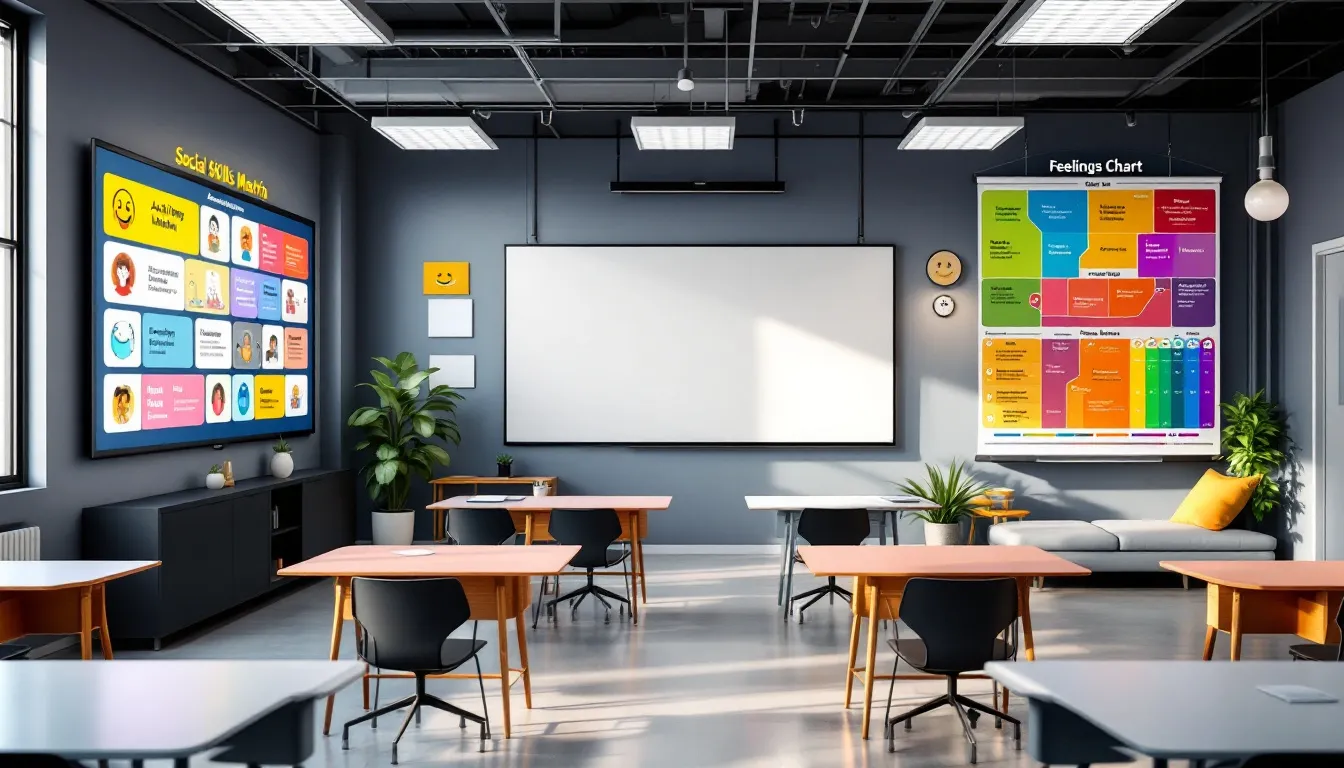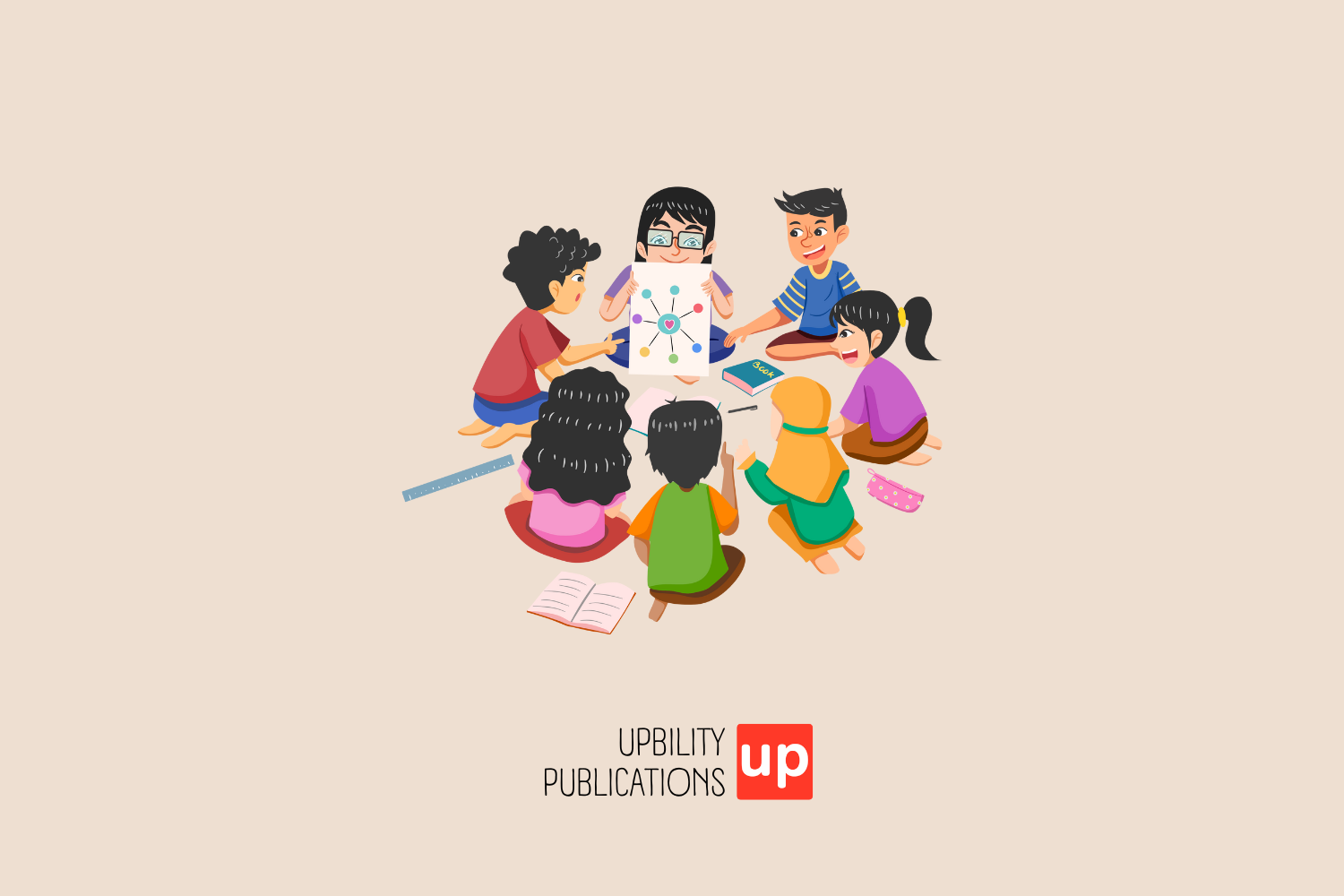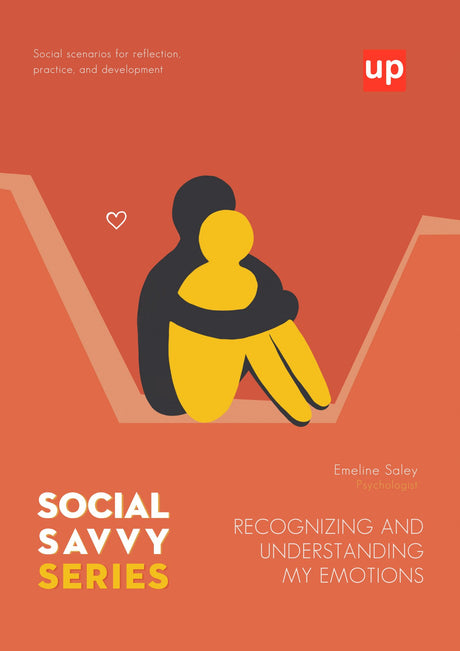Best Social Skills Resources for Kids: Activities and Games for Success
Searching for effective social skills resources? This article offers practical tools and activities to help kids improve their communication, interaction, and emotional regulation skills.
Key Takeaways
- Free social skills downloads are available for children aged 6 to 18, offering tailored activities for educators, parents, and therapists.
- Games and activities are effective in building communication and emotional regulation skills, enhancing children’s ability to express themselves and manage feelings.
- Community involvement and structured classroom programs are essential for promoting social behavior, fostering empathy, and developing interpersonal skills in children.
Free Social Skills Downloads

Access to free social skills downloads can be a game-changer for educators, parents, and therapists alike. Numerous resources are available online, catering to children from approximately 6 to 18 years old. These downloadable materials cover a wide range of social skills activities, including social communication, interaction, and emotional regulation. Designed specifically for use by parents, teachers, and speech-language pathologists, these resources offer specialized teaching and therapy methods suitable for various settings, including social skills groups and individual therapy.
For children with autism, these resources are particularly beneficial as they incorporate specialized methods that can be utilized across different environments. The versatility of these free downloads ensures that they can be adapted to meet the unique needs of each child, making them invaluable tools for promoting positive social behavior and achieving social goals.
Utilizing these free tools allows for consistent support to children as they navigate their social and emotional journeys.
Fun Games to Build Communication Skills

Games offer a fun and effective method to enhance communication skills in children. One popular game, The Name Game, helps kids learn their peers’ names while fostering attentiveness. Another engaging activity involves students describing objects or feelings, which enhances their ability to articulate thoughts and express emotions. Creative storytelling activities also allow children to collaborate and improve their verbal communication skills, building self-confidence as they practice speaking in structured scenarios.
Games that focus on nonverbal communication skills, such as expression mimicking, teach children to understand and interpret facial expressions and their meanings. Using visual aids in these games can further help children better understand and express their feelings. Additionally, cooperative games that require turn-taking are vital for teaching patience and the importance of listening, essential components of effective communication.
Team sports offer another avenue for building communication skills. Participating in sports helps children develop self-esteem and a sense of belonging, promoting positive social interactions. Incorporating these enjoyable and interactive games into daily routines creates a supportive environment for children to practice and improve their communication skills.
Activities to Teach Emotional Regulation
Teaching emotional regulation is crucial for helping children manage their emotions effectively. One effective method is color-coding emotions into zones, which helps children articulate and manage their emotional states. Mood cards can also assist children in recognizing and discussing their feelings, providing a visual and tangible way to understand their emotions.
Mindfulness activities, such as breathing exercises and creating a dedicated relaxation space, can help children develop awareness of their emotions and regulate them. Physical activities like running or jumping can also be effective in helping children release pent-up emotions. Reading stories that involve emotional experiences and modeling managing emotions in front of children are additional strategies that can aid in teaching emotional regulation.
Role-playing and active listening activities are also beneficial for teaching emotional regulation. Engaging in role-playing scenarios allows children to practice empathy and understand diverse perspectives, while active listening exercises develop their patience and improve understanding of others.
These activities, combined with a structured social skills program incorporating elements of social and emotional learning in a school setting, create a supportive learning environment for children.
Strategies for Developing Interpersonal Skills

Developing strong interpersonal skills is essential for effective social interactions. One key strategy is teaching empathy through active listening, where individuals learn to hear others without interruptions. Perspective taking activities, such as using literature and films that present diverse characters, allow children to recognize the value of different viewpoints. Encouraging self-reflection through journaling also promotes awareness of one’s own thoughts and enhances empathy.
Pretend play and role-playing activities further support the development of interpersonal skills, conflict resolution skills, and problem solving skills. By engaging in pretend scenarios, children can practice negotiation and collaborative play with peers, which helps them develop listening skills and learn to navigate challenges and conflicts.
Peer-Mediated Instruction and Interventions (PMII) leverage peer relationships to enhance academic and social learning, providing opportunities for children to practice empathy and communication in a supportive environment. Teaching children to interpret body language correctly can also reduce misunderstandings in interactions, further strengthening their interpersonal skills.
Classroom-Based Social Skills Programs

Classroom-based social skills programs play a pivotal role in enhancing student engagement and academic success. Research has shown that social skills can be more predictive of future success than academic performance, highlighting the importance of early social skill education. Programs like the Positive Action social skills curriculum help students identify their self-concept and improve social interactions.
Educators can utilize digital tools to enhance their teaching strategies with professional development resources, enabling effective integration of social and emotional learning (SEL) into the curriculum. The service also allows users to share materials with colleagues, promoting collaborative learning and the dissemination of best practices. Free downloads of activities designed to foster understanding and acceptance of differences among students are available, which can be utilized in classrooms or therapy sessions, further supporting social learning.
These programs not only teach social skills but also create a supportive and inclusive environment where students can thrive. By incorporating SEL into the classroom, educators can help students develop the emotional and interpersonal skills needed for long-term success.
Social Skills Resources by Upbility
Upbility offers a comprehensive collection of social skills resources designed to support children’s development in communication, emotional regulation, and interpersonal skills. Their extensive range of materials includes free social skills downloads and evidence-based activities suitable for various age groups and developmental stages. These resources are crafted to assist educators, parents, and speech-language pathologists in teaching essential skills such as nonverbal communication, conflict resolution, and empathy. Upbility's tools are adaptable for use in classroom settings, therapy sessions, and at home, making them versatile for different learning environments. With Upbility, children can engage in fun and interactive social skills activities that help build confidence, improve problem-solving abilities, and foster positive social interactions, ultimately supporting their journey towards achieving social goals.
Community Involvement and Social Goals
Community involvement is a powerful tool for promoting social behavior and teaching good manners. Participating in community service activities helps children understand others’ needs and fosters empathy. Team sports, community gardening, and other group activities promote teamwork, emotion recognition, and appropriate reactions to winning or losing, further enhancing social competence and teaching responsibility.
Community involvement plays a critical role in promoting social behavior and teaching good manners. Participating in community-based activities helps children develop a sense of belonging and learn to interact positively with others. These activities also provide opportunities for families to work together towards common social goals, strengthening their bonds and fostering a supportive environment for social learning.
Role-Playing and Pretend Play
Role-playing and pretend play are essential for fostering empathy, problem-solving abilities, and effective social interactions. By role-playing different scenarios, children can practice understanding various perspectives and develop their social skills. Pretend play, where children create scenarios and take on different roles, helps them recognize behaviors and communicate feelings.
Using stuffed animals or dolls in play can further help children recognize emotions and de-escalate situations. Pretending to parent another child teaches them to adapt to new situations and understand the emotions of others.
Overall, role-playing and pretend play provide a safe and engaging way for children to practice social interactions and develop essential social and emotional skills.
Resources for Special Education Support
Supporting students with disabilities requires access to specialized resources and evidence-based practices (EBPs). Implementing EBPs in special education enhances academic, social, and behavioral outcomes for students with disabilities, helping educators demonstrate accountability and meet legal obligations. Universal Design for Learning (UDL) provides multiple means of representation, engagement, and expression to support diverse learners, ensuring that all students have equal opportunities to succeed.
Tools designed for social-emotional learning can include features that support students with disabilities, such as text-to-speech and visual aids. These resources are invaluable for parents and educators, providing the necessary support to help students with disabilities develop essential social and emotional skills.
Utilizing these tools fosters an inclusive learning environment tailored to meet each student’s unique needs.
Using Technology to Enhance Social Learning

Technology offers innovative ways to enhance social and emotional learning (SEL). Digital tools provide engaging, interactive platforms that appeal to today’s digital-native students, significantly improving SEL outcomes. Gamification in SEL applications encourages student participation by incorporating reward systems for achieving emotional milestones, making the learning process fun and motivating.
Digital platforms also allow SEL programs to reach a broader audience, making resources available remotely and thus more accessible than traditional in-person programs. During the trial, users have access to targeted skills and resources tailored for various age groups, ensuring that the content is relevant and effective for each child’s developmental stage.
Integrating technology into social learning provides children with engaging and interactive experiences, enhancing their social and emotional development.
Social Skills Curriculum and Lesson Plans
A well-structured social skills curriculum and lesson plans are essential for teaching children how to navigate social interactions effectively. Numerous free resources are available, including social stories, worksheets, and activity guides tailored for different age groups. Educational materials like task cards and games can be downloaded for free, focusing on various aspects of social skills development such as empathy and conversation starters.
The program offers thousands of ready-to-use materials aimed at enhancing communication and social behavior. One notable curriculum is the KinderSocialSkills program, which features 75 social skills taught through engaging stories involving characters like Tom Cat and Tabby Cat. Each social skill is covered over two days, with day one focused on introducing the skill and day two on practical application.
The KinderSocialSkills curriculum includes differentiated materials to cater to both non-writers and writers, ensuring accessibility for all students. Independent writing sheets are also provided to reinforce the social skill learned each day. Using these comprehensive and engaging lesson plans, educators can effectively teach social skills and establish a supportive learning environment for children.
Start Your Free Trial Today
Don’t miss the opportunity to start improving social skills with a free trial of our comprehensive program. For 30 days, you can explore various aspects and features of the social skills program without any financial commitment.
If you’re not satisfied with the service, there’s a money-back guarantee within 30 days, ensuring that you can try the program risk-free. Sign up for your free trial today and give children the tools they need for successful social interactions.
Summary
In conclusion, developing strong social skills is essential for children’s success in all areas of life. By utilizing free resources, engaging games, insightful activities, and effective strategies, you can help children enhance their communication, emotional regulation, and interpersonal skills. Whether you’re a parent, educator, or therapist, these tools will provide the support needed to foster positive social interactions and emotional learning. Start your journey today and empower children to thrive socially and emotionally.
Frequently Asked Questions
What age groups are these social skills resources suitable for?
These social skills resources are suitable for children aged 6 to 18 years, addressing a wide range of developmental stages.
How can games help in building communication skills?
Games can significantly enhance communication skills by encouraging articulation of thoughts and expression of emotions through interactive activities like The Name Game and creative storytelling. Engaging in these games fosters verbal communication practice, which is essential for effective interaction.
What are some effective activities for teaching emotional regulation?
Color-coding emotions, using mood cards, practicing mindfulness exercises, and engaging in role-playing scenarios are effective activities for teaching emotional regulation. These methods encourage children to identify and manage their feelings in a constructive way.
How can community involvement benefit children's social development?
Community involvement fosters children's social development by enhancing empathy, teamwork, and social competence through activities like service projects and sports. Engaging with others in these settings cultivates essential social skills that benefit their overall growth.
What support is available for students with disabilities?
Students with disabilities can access special education resources, including Universal Design for Learning (UDL) and tools for social-emotional learning, which provide features like text-to-speech and visual aids. These supports are designed to enhance accessibility and learning outcomes.
Original content from the Upbility writing team. Reproduction of this article, in whole or in part, without attribution to the publisher is prohibited.
References
- Gresham, F. M., & Elliott, S. N. (2008). Social Skills Improvement System (SSIS) Rating Scales. Pearson Assessments.
- McKown, C., Gumbiner, L. M., & Russo, N. M. (2009). Social-emotional learning skill, self-regulation, and social competence in typically developing and clinic-referred children. Journal of Clinical Child & Adolescent Psychology, 38(6), 858-871.
- Elias, M. J., & Weissberg, R. P. (2000). Primary prevention: Educational approaches to enhance social and emotional learning. Journal of School Health, 70(5), 186-190.
- Zins, J. E., Weissberg, R. P., Wang, M. C., & Walberg, H. J. (Eds.). (2004). Building academic success on social and emotional learning: What does the research say? Teachers College Press.
- Humphrey, N., & Wigelsworth, M. (2016). Making the case for universal school-based mental health screening. Emotional and Behavioural Difficulties, 21(1), 22-42.
- CASEL. (2020). SEL impact: The impact of social and emotional learning. Collaborative for Academic, Social, and Emotional Learning. Retrieved from https://casel.org/impact/
- Durlak, J. A., Weissberg, R. P., Dymnicki, A. B., Taylor, R. D., & Schellinger, K. B. (2011). The impact of enhancing students’ social and emotional learning: A meta-analysis of school-based universal interventions. Child Development, 82(1), 405-432.









